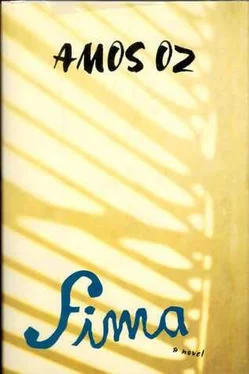Fima opened his eyes. He looked up at Uri's towering form with an anxious, pleading, childlike expression. He did not feel surprised, because he had always expected it would be something like this. With his lips only, without any voice, he asked:
"Dimi?"
"Dimi's fine."
"Yael?"
"It's your father."
"He's not well. I know. For several days now…"
Uri said:
"Yes. No. Worse."
In a strange and wonderful way Fima was infected with Uri's wonted self-possession. Softly he asked:
"When exactly did it happen?"
"At midday. Four hours ago."
"Where?"
"At home. He was sitting in his armchair drinking Russian tea with a couple of old ladies who had come to ask him for a donation to some charity. The Blind Society or something. They said he was just starting to tell a joke or a story, when he suddenly groaned and passed away. Just like that. Sitting in his armchair. He didn't have time to feel anything. And since then we've all been searching for you."
"I see," said Fima, putting his coat back on. It was strangely sweet to feel his heart filling not with grief or pain but with a surge of adrenaline, of sober, practical energy.
"Where is he now?"
"Still at home. In the armchair. The police have been. There's some sort of a delay about moving him — it doesn't matter right now. The woman downstairs, who's a doctor, was there within a couple of minutes, and she checked that it was all over. Apparently she was a close friend of his too, Tsvi and Teddy and Shula are supposed to be waiting for you there. Nina is going there straight from her office as soon as she's finished making all the arrangements and dealing with the formalities."
"Good," said Fima. "Thank you. Let's go there."
After a moment he added:
"What about you, Uri? Straight from the plane? You just dropped your luggage off and came looking for me?"
"We didn't know where you'd got to."
Fima said:
"I ought to make you a cup of coffee at least."
Uri said:
"Forget it. Just concentrate for a moment and think carefully if there's anything you need to take with you."
"Nothing," Fima replied at once in a military tone, with uncharacteristic firmness. "No time to waste. Let's get moving. We'll talk on the way."
30. AT LEAST AS FAR AS POSSIBLE
IT WAS A QUARTER PAST FIVE WHEN URI PARKED HIS CAR ON BEN Maimon Avenue. The sun had sunk behind the pines and cypresses, but a strange grayish light full of vague flickers still hovered in the sky, a light that was neither day nor night. Upon the avenue and the stone buildings lay a fine, heart-gnawing Sabbath eve melancholy. As if Jerusalem had stopped being a city and returned to being a bad dream.
The rain had not resumed. The air was saturated, and Fima's nostrils picked up the tang of rotting leaves. He recalled how once when he was a child, at such a time as this, at the onset of the Sabbath, he was riding his bicycle up and down the dead street. Looking up at this building, he saw his mother and father standing on the balcony. They were stiffly erect, of similar height, both dressed in dark clothes, standing very close to each other but not touching. Like a pair of waxworks. And he had the impression that they were both in mourning for a visitor whose arrival they had long since despaired of and yet whom they continued to expect. For the first time in his life he sensed the depth of the shame concealed in the silence that lay between them, all through his childhood. Without any quarrels or complaints or disagreements. A polite silence. He got off his bicycle and asked shyly if it was time for him to come in.
Baruch said:
"As you wish."
His mother said nothing.
This memory awoke in Fima a pressing need to clarity something, to ask Uri, to make inquiries. He had the feeling that he had forgotten to check the thing that mattered most. But what it was that mattered most he did not know. Although he sensed that now his ignorance was thinner than usual, like a lace curtain behind which dim shadows moved. Or a threadbare garment that covers the body but no longer warms it. While he knew in his bones how much he longed to continue not knowing.
As they climbed the stairs to the third floor, Fima put his hand on Uri's shoulder. Uri seemed tired and gloomy. Fima felt a need to encourage, with this touch, his large friend, who had once been a well-known combat pilot and still went around with his head thrust aggressively forward, a sophisticated airman's watch on his wrist, and his eyes sometimes giving the impression that he saw everything from above.
And yet he was a warm-hearted, honest, devoted friend.
On the door was fixed a brass plate inscribed, in black letters on gray: NOMBERG FAMILY. Underneath it, on a square piece of card, Baruch had written in his firm handwriting: "Kindly refrain from ringing the bell between the hours of one and five p.m." Unconsciously Fima shot a glance at his watch. But there was no need to ring anyway; the door was ajar.
Tsvi Kropotkin intercepted them in the hall, like a conscientious staff officer who has been detailed to brief newcomers before admitting them to the operations room. Despite the ambulance drivers' strike, he said, and the approach of the Sabbath, the tireless Nina had managed to arrange on the phone from her office for his father to be moved to the mortuary at Hadassah Hospital. Fima felt a renewed affection for Tsvi's shy embarrassment: he looked less like a famous historian and head of a department than a youth leader whose shoulders have begun to stoop, or a village schoolmaster. Fima also liked the way Tsvi's eyes blinked behind his thick lenses, as though the light was suddenly too bright, and his habit of fingering absent-mindedly everything he came in contact with, dishes, furniture, books, people, as though he always had to wrestle with a secret doubt about the solidity of everything. If it had not been for the Jerusalem mania, and Hitler, and his obsession with Jewish responsibility, this modest scholar might have settled down in Cambridge or Oxford and lived quietly to be a hundred, dividing his time between the golf course and the Crusades, or between tennis and Tennyson.
Fima said:
"You were right to move him. What would he have done here all weekend?"
In the salon he was surrounded by his friends, who reached out from every side and touched him gently on his shoulder, his cheek, his hair, as though through his father's death he had inherited the role of invalid. As though it was their duty to check carefully to sec if he was too hot or too cold or shivering, or planning secretly to leave them without warning. Shula thrust a cup of lemon tea with honey into his hand. And Teddy sat him down gently at one end of the brocade-covered sofa on which embroidered cushions were scattered. They all seemed to be waiting expectantly for him to say something. Fima responded:
"You're all wonderful. I'm sorry to spoil your Friday night like this."
His father's armchair was standing exactly facing him: deep, wide, covered with red leather and with a red leather headrest, looking as though it were made of raw flesh. The footstool seemed to have been pushed slightly to one side. Like a royal scepter, the cane with its silver band rested against the right-hand side of the chair.
Shula said:
"At any rate, one thing's certain: he didn't suffer at all. It was over in a moment. It's what they used to call death by a kiss: only the righteous are granted it, so they used to say."
Fima smiled:
"Righteous or not, kisses were always an important part of his repertoire." As he said this, he observed something that he had never noticed before: Shula, whom he dated more than thirty years ago, before the billy-goat year, and who at that time had a fragile girlish beauty, had aged and gone quite gray. Her thighs had grown so fat that she looked like an ultrapious woman worn out by childbearing but who accepts her decrepitude with total resignation.
Читать дальше












